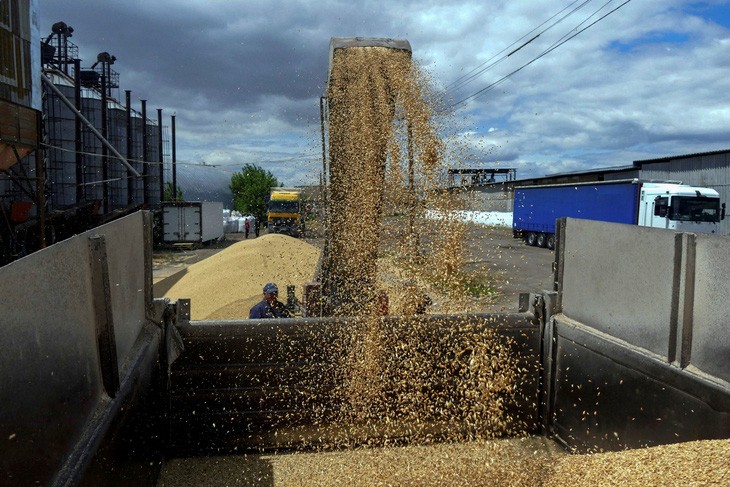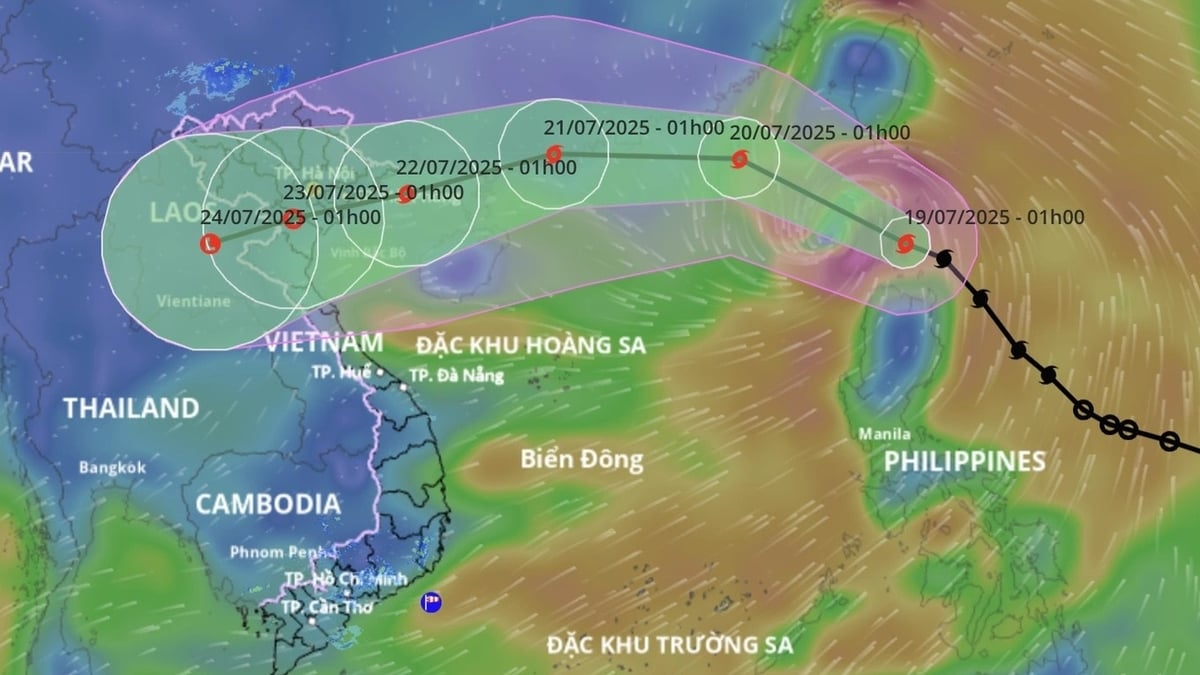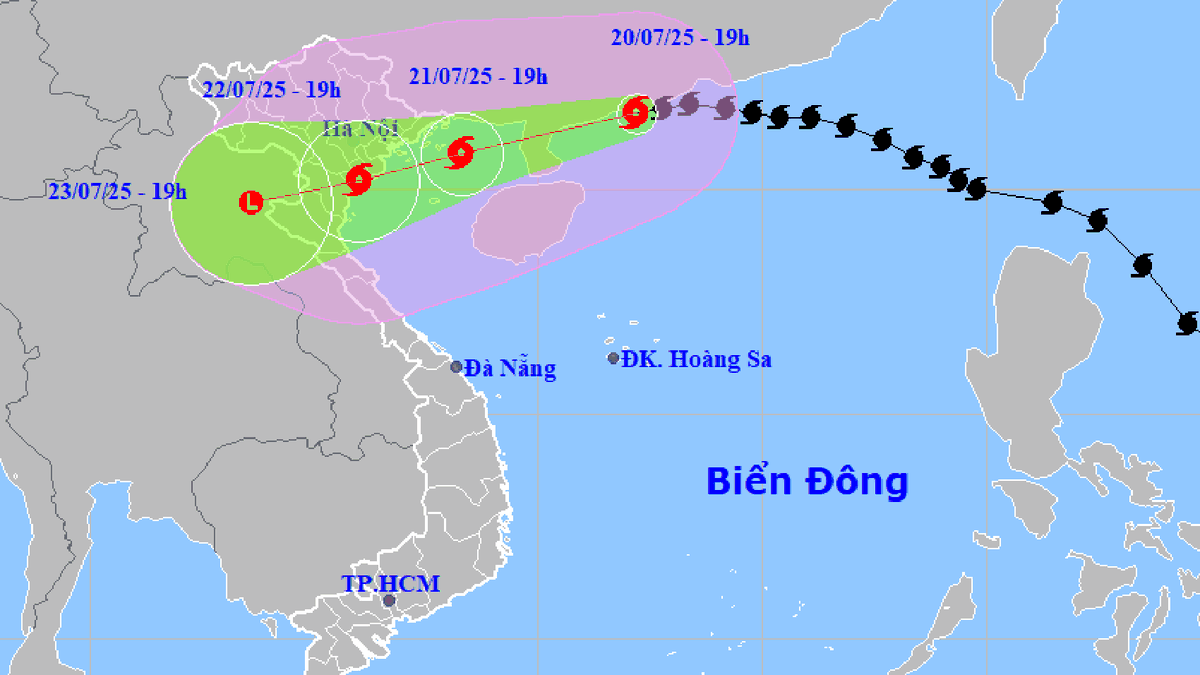 |
| Russia is ready to return to grain talks immediately, but only after its conditions are met. Pictured: A worker loads grain onto a truck during the barley harvest in Odessa, Ukraine. (Source: AFP) |
World economy
Oil output from the Organization of the Petroleum Exporting Countries (OPEC) fell in July after Saudi Arabia cut output further under the latest deal by OPEC and its allies, known as OPEC+, and supply from Nigeria was limited, a Reuters survey showed on July 31.
OPEC produced 27.34 million barrels per day (bpd) in July, down 840,000 bpd from June and the lowest since September 2021. OPEC's output was still nearly 1 million bpd below its target, partly due to Nigeria and Angola not being able to produce at the agreed level.
Saudi Arabia's output fell by 860,000 barrels per day in July from the previous month, according to the survey. The second-largest decline was in Nigeria, where energy giant Shell has suspended shipments of Forcados crude due to a possible leak at its export terminal. Production also fell in Libya as operations at several fields were halted due to protests. (Reuters)
US economy
* Less than a week after deciding to raise interest rates for the 11th time since March 2022, US Federal Reserve (Fed ) officials expressed hope to control inflation without hindering the job market, although this would require continuing to maintain high interest rates.
Chicago Fed President Austan Goolsbee believes that inflation will not fall immediately but at a moderate pace, without causing a sharp increase in unemployment. Officials hope that inflation will continue to improve, and this is a factor in the decision at the last and upcoming Fed meetings.
Meanwhile, Atlanta Fed President Raphael Bostic said he supported the decision to raise interest rates at the July meeting, but if the economy continues to strengthen, he would not agree with such a decision at the September meeting. (Reuters)
* In the national employment report, released by the US Automatic Data Processing Company (ADP) on August 2, experts commented that the US labor market has shown strong resilience, even in conditions of continuously rising interest rates, increasing costs and making borrowing capital to expand businesses more expensive.
According to ADP, July's job gain was 324,000 jobs, lower than June's revised 455,000 jobs, but nearly double the 185,000 jobs estimate that most analysts had given.
Robust jobs numbers and other encouraging economic data have raised hopes of a "soft landing" scenario for the world's largest economy, where inflation falls but does not trigger a major recession. (AFP)
Chinese Economy
* China's real estate sector is hoping for a revival thanks to policy support as the government affirms the importance of the sector in driving the economic recovery.
China's Minister of Housing and Urban-Rural Development Ni Hong affirmed that stabilizing the construction and real estate sectors determines the recovery of the economy.
Previously, a meeting of senior officials in late July requested timely adjustment and improvement of policies in the real estate sector in the new situation, when there are major challenges in the supply-demand relationship. (THX)
* China on July 31 issued export control regulations on some drone products to protect "national interests and security" amid growing disagreements between the country and the US over technology issues.
China's Commerce Ministry said the export restrictions on equipment, including some drone engines, lasers, communications equipment and drone defense systems, will take effect on September 1. (Reuters)
European Economy
* According to the latest figures, economic growth in the Eurozone recovered in the second quarter of 2023, but observers are still concerned about persistently high inflation and stagnation in the German economy.
The 20-nation eurozone economy grew 0.3% in the April-June period after recording zero growth in the first three months of this year, the European statistics agency Eurostat said.
Meanwhile, price growth eased slightly, from 5.5% in June 2023 to 5.3% in July 2023. Core inflation, which excludes food and energy prices, remained unchanged at 5.5%. (AFP)
* The European Union's (EU) plan to impose a tax on aviation fuel has hit a snag as the bloc's 27 member states have failed to agree on prices for green fuels and fossil fuels.
An EU diplomat said the disagreement between EU member states was unlikely to be resolved during Spain's rotating presidency of the EU until the end of the year.
Under the EU's proposal, the minimum tax on aviation fuel for flights within Europe will gradually increase over 10 years, while sustainable aviation fuel will be exempted from tax for 10 years to encourage its use. (Vietnam News Agency)
* As the conflict in Ukraine continues, the German economy continues to face a series of difficulties . According to the assessment of the country's leading economic associations, the outlook for Europe's leading economy is bleak in the coming months.
Economically, Germany is lagging behind other economies. Key economic indicators are trending downward. According to the current forecast of the International Monetary Fund (IMF), Germany is the only economy among 22 countries and regions under consideration to see a decline in GDP this year. (VNA)
* On August 1, US Permanent Representative to the United Nations (UN) Linda Thomas-Greefield said that there was information that Russia was ready to negotiate to resume the agreement within the framework of the Black Sea Grain Initiative, but the US has not seen any evidence related to such action.
The US diplomat said Washington had seen signs that Moscow might be interested in returning to the talks and was waiting for Russia to act.
For its part, Russia said that if demands for improved grain and fertilizer exports are met, it will consider reviving the Black Sea grain deal brokered by the UN and Turkey in July 2022 to ease the global food crisis following the conflict in Ukraine.
Russia is ready to return to negotiations on a grain deal immediately, but only after its conditions are met, Kremlin spokesman Dmitry Peskov was quoted by the RIA state news agency as saying on August 1. (TTXVN)
* Russian energy giant Gazprom said on August 1 that on July 31, Russian gas supplies via the Power of Siberia pipeline to China once again exceeded the daily contracted volume and set a new record.
Russian Deputy Prime Minister in charge of energy Alexander Novak said that by the end of 2022, Russia had exported 15.5 billion cubic meters to China via the Power of Siberia gas pipeline. Russian gas supplies to China via the Power of Siberia pipeline will reach 22 billion cubic meters in 2023. (VNA)
* The Ukrainian government expects the country's economy to grow by around 5% in 2024, thanks to investment in the country's reconstruction and strong consumer demand.
Ukraine's economy ministry estimates the country's gross domestic product (GDP) will grow by around 2.8% this year. Ukraine's economy is set to shrink by more than 30% in 2022, marking its biggest annual decline in more than 30 years. (Reuters)
Japanese and Korean Economy
* According to Nikkei Asia on August 3, although Japanese bond yields are rising after the Bank of Japan (BoJ) adjusted its policy last week, speculation that the BoJ has no plans to end monetary easing has pushed the Yen down again .
The yield on new 10-year Japanese government bonds rose to 0.625% on August 2, the highest since April 2014. The Bank also conducted a scheduled bond-buying operation on August 2.
The yen's depreciation was seen as a factor in the bank's move. But the Japanese currency has weakened about 5 yen against the dollar since the BoJ's move, trading in the 143 yen/dollar range on August 2. (TTXVN)
 |
| In June 2023, South Korea's inflation fell below 3% for the first time since September 2021. (Source: Getty Images) |
* Consumer prices in South Korea slowed down for the sixth consecutive month in July 2023, hitting a 25-month low due to falling oil prices, according to Statistics Korea.
Consumer prices, a key gauge of inflation, rose 2.3% year-on-year in July 2023, down from 2.7% in June 2023, marking the slowest increase since June 2021.
In June 2023, South Korea's inflation fell below 3% for the first time since September 2021. (Yonhap)
* South Korea's summer electricity demand is expected to peak next week , the Ministry of Trade, Industry and Energy said. The government will closely monitor supply due to a power plant shutdown and a fast-moving typhoon.
The country's peak electricity demand is expected to rise to 92.5-97.8 GW around August 10, the peak this summer, up from 91.1 GW in 2022 due to hotter weather conditions this summer, the ministry said.
South Korea is also bracing for the possible impact of Typhoon Khanun as it approaches Japan's southwestern islands.
The country's energy reserves are expected to fall to between 6 and 11.3 GW, and the government has said it will prioritize securing energy supplies. (Yonhap)
ASEAN Economy and Emerging Economies
* On July 28, the Indonesian Ministry of Trade and the Commodity Futures Trading Regulatory Agency (Bappebti) launched the first Cryptocurrency Exchange (CFX) in the Southeast Asian country, as part of efforts to ensure the safety of crypto asset traders.
The move reflects the Indonesian government’s commitment to providing certainty for businesses while creating a fair crypto asset trading ecosystem.
The new exchange will provide clear regulations to protect consumers and give them a sense of security when conducting cryptocurrency transactions, thereby contributing to the country's economy and trade. (TTXVN)
* The Malaysian Palm Oil Council (MPOC) said on August 1 that the country's crude palm oil prices will trade at 3,700-4,200 Ringgit (RM) (818-929 USD)/ton in the second half of 2023 and will remain supported in the long term .
MPOC deputy director Mohd Izham Hassan said palm oil prices are likely to rise above RM4,300 per tonne by 2024.
Palm oil output in Malaysia, the world's second-largest producer, was nearly 3% lower in the first half of 2023 than in the same period last year. The country's crude palm oil futures have also fallen 7% year-to-date. (VNA)
* Australian Trade Minister Don Farrell on August 2 expressed hope that the country's dispute with China over tariffs on Australian barley would be resolved within the next few days.
In an interview with ABC state television, Mr. Farrell said: "We have suspended the dispute at the World Trade Organization (WTO) in the belief that China will quickly review its tariff system on barley. The deadline for China to act and make a decision ends next week. So I hope that within the next few days we will receive a positive decision from China." (TTXVN)
Source

























![[Photo] National Assembly Chairman Tran Thanh Man visits Vietnamese Heroic Mother Ta Thi Tran](https://vphoto.vietnam.vn/thumb/1200x675/vietnam/resource/IMAGE/2025/7/20/765c0bd057dd44ad83ab89fe0255b783)







































































Comment (0)